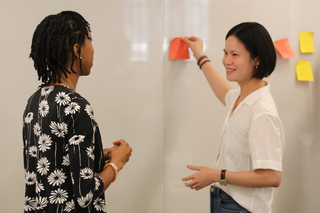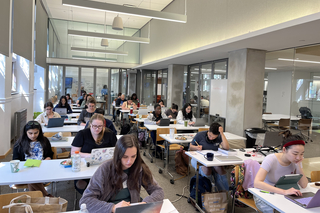A strong prospectus is the springboard toward a successful dissertation. More than just a requirement for becoming “all but dissertation” (ABD), the prospectus contains the foundational research and methodological roadmap you’ll build on as you complete your project. While writing your prospectus, you’ll identify your dissertation goals, present the significance of your work, and build momentum to carry out your research and writing. The feedback you receive from your committee will help sharpen your focus and set you up to make an impact on the field.
Get Feedback on Your Prospectus
Schedule a 1–1 consultation to get prospectus feedback at any stage, from brainstorming, to drafting, to polishing the final submission.
Prospectus Guidelines
Prospectuses vary significantly in length and format from one department to the next. While specific requirements differ, most prospectuses contain the following parts:
- an abstract
- the background and significance of your project
- a literature review
- a description of the preliminary work you have completed
- an explanation of your method or approach
- potential limitations or issues with the project
- a timetable for completion
- a conclusion
- a list of references
This prospectus checklist, written by GWL Fellow Jennifer Strtak, outlines in more detail the components of most dissertation prospectuses.
In addition to the model prospectuses linked below, many departments make approved prospectuses available for prospectus writers to learn from.
Model Prospectuses from the Humanities
-
Music
“‘Old Times There Are Not Forgotten’: White Southern Nostalgia and Sonic Dimensions of Civil War Memory”
by Chloe Smith
-
History
“Useful Citizenship: Jewish Politics in the Age of American State Transformation, 1865-1933”
by Jacob Morrow-Spitzer
-
History of Art
“Reconstruction’s Objects: Art in the United States South 1861-1900”
by Elizabeth Keto
-
American Studies and Women's, Gender, and Sexuality Studies
“Corrugated Care: The Kinship of Cardboard and an Enfolding Empire”
by Minh Huynh Vu
-
Music
“The rise of ‘vibe:’ How deep learning algorithms are redefining genre in the age of music streaming”
by Nicole Cosme-Clifford
-
Music
“Ballare della modernitá: Dance and cultural discourses in Post-Unification Italy”
by Taryn Dubois
-
History
“Classical Greece in the European Imperial Imagination, 1500-1700”
by Alexander Batson
Model Prospectuses from the Sciences
-
Ecology & Evolutionary Biology
“Heat Stress & Population Forecasting”
by Alison Robey
-
Molecular Biophysics & Biochemistry
“Investigating DNA damage-independent functions for MRN complex members in mitosis”
by Elizabeth Black
-
Mechanical Engineering
“Detection of REM Sleep Behavior Disorder using Wearable Textile Sensors”
by Anjali Agrawala
-
Chemistry
“Insights into Novel Metabolism of Human RECON Homologs”
by Randy Hamchand
-
Environment
“Life Cycle Sustainability Assessment of Carbon Dioxide Removal Via Enhanced Rock Weathering”
by Jennifer Kroeger
-
Cell Biology
“Molecular mechanisms that coordinate retrograde movement and degradative function of axonal lysomes”
by Layla Nassar
-
Chemistry
“Spatiotemporal visualization and structural characterization of cellular metabolism”
by Sydney Schuster
-
Astronomy
“Probing the formation of ultra-diffuse galaxies with observations”
by Zili Shen
-
Biology
“Dissertation Prospectus on KRAS”
by Yanixa Quiñones Avilés
-
Physics
“Two-Phase Xenon Time Projection Chambers for WIMP Searches and Other Applications”
by Nicole Larsen
-
Biology
“Performance of Reverse Osmosis Membranes in Ultrahigh Pressure and Hypersaline Environments: Measurements, Mechanisms, Modelling”
by Kevin Pataroque
-
Molecular Biophysics & Biochemistry
“Role of the coilin N-terminal domain and nopp140 in Cajal body formation”
by Sara Gelles-Watnick
-
Microbiology
“Microbiology Dissertation Prospectus”
by Mara Kushelman
Model Prospectuses from the Social Sciences
-
Political Science
“Seeing Sex Like a State”
by Chetana Sabnis
-
Public Health
“Multigenerational Cohort Studies of Grandmaternal Factors and Neurodevelopment in Grandchildren”
by Jingyuan Xiao
-
Psychology
“Moral Life Under Phenomenological Uncertainty”
by Vladimir Chituc
-
Sociology
“Working to Love: Discourses of Expertise in and Effort in Elites’ Romantic Relationships”
by Adora Svitak
Explore GWL Programs
-
Writing Consultations
Get 1-on-1 feedback at any stage of the writing process—from brainstorming to final edits.
-
Workshops & Panels
Interactive opportunities to grow your academic writing knowledge or expand your toolkit of skills.
-
Peer-Review Groups
Groups of 4–7 students who meet weekly to share feedback, make progress, and support one another on a common project.
-
Writing Retreats & All Writes
Full-day and half-day events where graduate students set goals and write as a community in a quiet, supportive space.
-
Audience
-
Category


